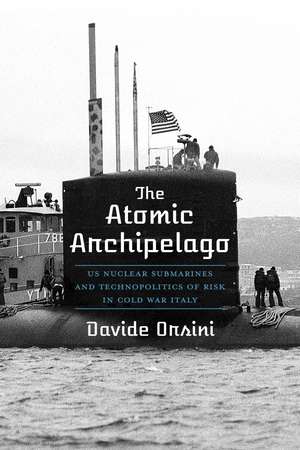The Atomic Archipelago: US Nuclear Submarines and Technopolitics of Risk in Cold War Italy: INTERSECTIONS: Histories of Environment
Autor Davide Orsinien Limba Engleză Hardback – 24 mai 2022
In 1972, the US Navy installed a base for nuclear submarines in the Archipelago of La Maddalena off the northeastern shore of Sardinia, Italy. In response, Italy established a radiation surveillance program to monitor the impact of the base on the environment and public health. In the first systematic study of nuclear expertise in Italy, Davide Orsini focuses on the ensuing technopolitical disputes concerning the role and safety of US nuclear submarines in the Mediterranean Sea from the Cold War period to the closure of the naval base in 2008. His book follows the struggles of different groups—including local residents of the archipelago, US Navy personnel, local administrators, Italian experts, and politicians—to define nuclear submarines as either imperceptible threats, much like radiocontamination, or efficient machines at the service of liberty and freedom.
Unlike inland nuclear power plants, vividly present and visible with their tall cooling towers and reactor containers, the mobility and invisibility of submarines contributed to an ambivalence about their nature, perpetuating the idea of nuclear exceptionalism. In Italy, they symbolized objects in constant motion, easily removable at the first sign of potential harm. Orsini demonstrates how these mobile sources of hazard posed special challenges for both expert assessments and public understandings of risk, and in contexts outside the Anglo-Saxon world, where unique social power dynamics held sway over the outcome of technopolitical controversies.
Din seria INTERSECTIONS: Histories of Environment
-
 Preț: 436.80 lei
Preț: 436.80 lei -
 Preț: 200.41 lei
Preț: 200.41 lei -
 Preț: 400.33 lei
Preț: 400.33 lei -
 Preț: 430.27 lei
Preț: 430.27 lei -
 Preț: 359.45 lei
Preț: 359.45 lei -
 Preț: 427.77 lei
Preț: 427.77 lei -
 Preț: 459.98 lei
Preț: 459.98 lei -
 Preț: 500.91 lei
Preț: 500.91 lei -
 Preț: 333.77 lei
Preț: 333.77 lei - 15%
 Preț: 457.24 lei
Preț: 457.24 lei -
 Preț: 461.72 lei
Preț: 461.72 lei -
 Preț: 320.52 lei
Preț: 320.52 lei -
 Preț: 350.79 lei
Preț: 350.79 lei -
 Preț: 387.44 lei
Preț: 387.44 lei
Preț: 492.26 lei
Nou
Puncte Express: 738
Preț estimativ în valută:
94.19€ • 98.61$ • 77.94£
94.19€ • 98.61$ • 77.94£
Carte disponibilă
Livrare economică 17-31 martie
Preluare comenzi: 021 569.72.76
Specificații
ISBN-13: 9780822947189
ISBN-10: 0822947188
Pagini: 332
Ilustrații: 34 b&w illustrations
Dimensiuni: 152 x 229 x 33 mm
Greutate: 0.52 kg
Editura: University of Pittsburgh Press
Colecția University of Pittsburgh Press
Seria INTERSECTIONS: Histories of Environment
ISBN-10: 0822947188
Pagini: 332
Ilustrații: 34 b&w illustrations
Dimensiuni: 152 x 229 x 33 mm
Greutate: 0.52 kg
Editura: University of Pittsburgh Press
Colecția University of Pittsburgh Press
Seria INTERSECTIONS: Histories of Environment
Recenzii
"The Atomic Archipelago is not just an excellent historical study but also offers an original theoretical perspective on knowledge production in the field of radiological risk that can be useful to a range of scholars, not just experts of the Cold War."
—Technology and Culture
“Davide Orsini's book digs into the murky Cold War past of La Maddalena, when the Sardinian islands housed one of the largest US nuclear submarine bases in the Mediterranean. It thus admirably shows how classified defense imperatives placed the archipelago in state of law exception under the subservient eye of obliging Italian politicians, while the submarines’ radioactive pollutants featured as stodgy ingredients of an à la carte menu served to unknowing visitors and locals alike. The Atomic Archipelago finally unearths what, alarmingly, decades of deception have kept under wraps.” —Simone Turchetti, author of Greening the Alliance: The Diplomacy of NATO’s Science and Environmental Initiatives
“Submarines are some of the most ubiquitous yet understudied nuclear technologies in circulation. In this brilliant book, Orsini takes readers on a deep dive into the history of the United States’ Cold War nuclear submarine base in the Maddalena archipelago on the island of Sardinia in Italy. This rich and powerful historical ethnography sheds new light on radiological risk and contested knowledge production, the United States’ increasingly itinerant post-war militarism, and memory in an archipelago long coveted for its strategic associations.” —Mary X. Mitchell, University of Toronto
—Technology and Culture
“Davide Orsini's book digs into the murky Cold War past of La Maddalena, when the Sardinian islands housed one of the largest US nuclear submarine bases in the Mediterranean. It thus admirably shows how classified defense imperatives placed the archipelago in state of law exception under the subservient eye of obliging Italian politicians, while the submarines’ radioactive pollutants featured as stodgy ingredients of an à la carte menu served to unknowing visitors and locals alike. The Atomic Archipelago finally unearths what, alarmingly, decades of deception have kept under wraps.” —Simone Turchetti, author of Greening the Alliance: The Diplomacy of NATO’s Science and Environmental Initiatives
“Submarines are some of the most ubiquitous yet understudied nuclear technologies in circulation. In this brilliant book, Orsini takes readers on a deep dive into the history of the United States’ Cold War nuclear submarine base in the Maddalena archipelago on the island of Sardinia in Italy. This rich and powerful historical ethnography sheds new light on radiological risk and contested knowledge production, the United States’ increasingly itinerant post-war militarism, and memory in an archipelago long coveted for its strategic associations.” —Mary X. Mitchell, University of Toronto
Notă biografică
Davide Orsini is a science and technologies studies scholar studying the social, political, and ecological implications of nuclear power applications after the Second World War. He is currently a Marie Sklodowska Curie Fellow at the Rachel Carson Center for Environment and Society in Munich, where he is conducting a comparative research project on the history and socioecological aspects of nuclear power plant decommissioning.
